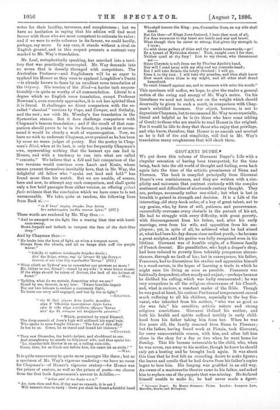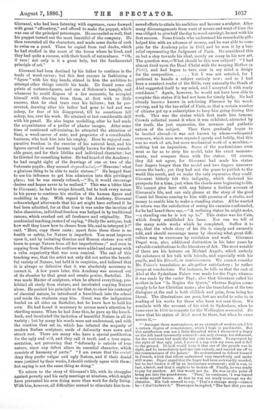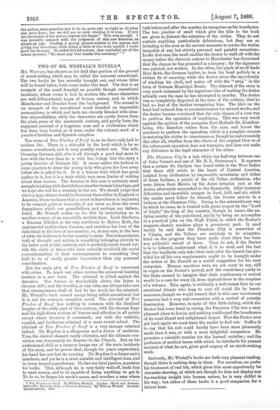GIOVANNI DITPRI1* WE put down this volume of Giovanni Dupre's
Life with a singular sensation of having been transported, for the time being, back into the old world of thought and feeling, even back again into the time of the artistic prominence of Siena and Florence. The book is compiled principally from Giovanni Dupre's own reminiscences, and they are written with a sim- plicity and naiveness that contrast curiously with the complex sentiment and difficulties of nineteenth-century thought. They are, perhaps, necessarily rather one-sided ; but what is lost in breadth is gained in strength and decision. It is a Life of the interesting, old story-book order, of a boy of great talent, not to say genius, who, by force of will, patience, and perseverance. successfully overcame every obstacle in the pursuit of his art, He had to struggle with every difficulty, with great poverty, with discouragement from his father, and, after his early marriage, even from his wife, and opposition from his em- ployers; yet, in spite of all, he achieved what he had aimed at, what had been his day-dream since earliest youth,—he became a great sculptor, and his genius was fully recognised even in his lifetime. Giovanni was of humble origin, of a Sienese family of French descent. His grandfather, who kept a draper's shop, had been reduced to poverty from tolerably prosperous circum- stances, through no fault of his ; but in consequence, his father, Francesco, had to discontinue his studies and apprentice himself to a wood-carver, in the hopes of learning a trade in which he might earn his living as soon as possible. Francesco was habitually despondent, often moody and unj nst,—perhaps because he disliked his calling, which was badly remunerated ; he was very scrupulous in all the religious observances of his Church, and, what is curious, a constant reader of the Bible. Though he was good at heart, his curious Puritanical temperament caused much suffering to all his children, especially to the boy Gio- vanni, who inherited from his mother, "who was as good as she was fair," his sensitive, artistic nature and strong religious convictions. Giovanni idolised his mother, and both his health and spirits suffered terribly in early child- hood from his father taking him from her. When he was five years old, the family removed from Siena to Florence ; but the father, having found work at Pistoia, took Giovanni, for some unaccountable reason, with him, and often left him alone in the shop for a day or two when he went home for Sunday. This life became unbearable to the child, who, when he was seven, ran away to his mother, though he knew he should only get a beating and be brought back again. It was about this time that he first felt an exceeding desire to make figures ; the leaves and scrolls.that he had drawn from his father's copies began to bore him. His longing was gratified in an odd way. An owner of a marionnette theatre came to his father, and asked him to replace one of the puppets that was missing. He declared himself unable to make it; he had never made a figure.
• Gioroanui Dupre. By Henry Simmona Fr:eze. London: Samp:on Low, Idarzeon, Searle, and Bizington.
Giovanni, who had been listening with eagerness, came forward with great "effrontery," and offered to make the puppet, which was one of the principal personages. He succeeded so well, that his puppet turned out the most beautiful of the company. He then renovated all the characters, and made some ducks of cork to swim on a pond. These he copied from real ducks, which he had studied in the court of the house where he lived, and they had quite a success, with their touch of naturalness. "Oh, ii vero ! not only is it a great help, but the fundamental principle of art."
Giovanni had been destined by his father to continue in the trade of wood-carver ; but this first success in fashioning a "figure" with his tiny hands, stirred in him the ambition to attempt other things outside his trade. He found some old prints of costume-figures, and one of Solomon's temple, and whenever he could dispose of a few moments, he occupied himself with drawing from them, at first with so little success, that he shed tears over his failures ; but he per- severed, drawing after his father had gone to bed and was asleep, for fear of his disapproval, till he sometimes fell asleep, too, over his work. He attained at last considerable skill with his pencil. He also began modelling, after be had made the acquaintance of a pedlar of plaster images. After some time of continued self-training, he attracted the attention of Sani, a wood-carver of note, and proprietor of a considerable business, who took him into his employ. Here he enjoyed com- parative freedom in the exercise of his natural bent, and his figures carved in wood became rapidly known for their remark- able grace, and for their lifelike and individual character ; but he thirsted for something better. He had heard of the Academy ; he had caught sight of the drawings of one or two of the fortunate pupils ; they seemed stapendissinzi,—" Heavens ! what a glorious thing to be able to make statues !" He begged Sani to use his influence to get him admission into this privileged place ; but he was sternly refused,—" No, it would encourage 'desires and hopes never to be realised." This was a bitter blow to Giovanni; he had to resign himself, but he took every means in his power to continue his studies of the human figure and modelling in clay. With regard to the Academy, Giovanni acknowledged afterwards that his art might have suffered if he had been admitted, for at that time it was under the incubus of false classicism, individual freedom was hedged in by traditional -canons, which crushed out all freshness and originality. The academical teaching, instead of saying, "Study the antique; look how well they knew how to choose from life, and to interpret it!" said, "Here, copy these casts ; apart from these there is no -health or safety, for Nature is imperfect. You must improve 'upon it, and by imitating Grecian and Roman statues you will learn to purge Nature from all her imperfections ;" and even in -copying from Nature, the outlines were added and cut away with -a calm superiority that was even comical. The end of this teaching was, that the artist not only did not notice the beauti- ful variety of Nature, but held it in suspicion, and believed that it is always so defective that it was absolutely necessary to correct it. A few years later, this Academy was aroused out of its slumber by that great and erratic genius, Bartolini. He was made Master of sculpture, when he altered everything, pro- hibited all study from statues, and inculcated copying Nature alone. He pushed his principle so far that, to show his contempt of classical nature, he introduced a hunchback into the school and made the students copy him. Great was the indignation burled on all sides on Bartolini, but he knew how to hold his own. He had found it necessary to arouse men's attention by startling means. When he had done this, he gave up the hunch- back, and inculcated the imitation of beautiful Nature in all its variety ; but by many his words were not understood, and with the reaction that set in, which has infected the majority of modern Italian sculpture, seeds of deformity were sown and struck root. There are many who have a special predilection for the ugly and evil, and they call it truth and a true repre- sentation, not perceiving that "deformity is outside of true 'nature, since any defect alters its essential character, which consists of harmony of parts." "I am aware that the veristi deny they prefer ,vulgar and ugly Nature, and if their denial were justified by their works, I should entirely agree with them ; hut saying is not the same thing as doing."
To return to the story of Giovanni's life, with its struggles against poverty and his early marriage at nineteen, which might have prevented his ever doing more than work for daily living. With him, however, all difficulties seemed to stimulate him to re- newed efforts to attain his ambition and become a sculptor. After many discouragements from want of means and want of time (he was obliged to give hall the day to wood-carving), he met with his first success. Some friends who understood his remarkable gifts helped him with an advance of money, and he was able to com- pete for the Academy prize in 1840, and he won it by a bas- relief representing the Judgment of Paris. He considered this
as but a step towards his ideal, merely an essay in his new art. The question was,—What should be this new subject? "I had. almost fixed upon the Dead Christ with the weeping Mother (a Pieta), and had begun to turn over in my mind a design
for the composition Yet I was not satisfied, for I preferred to handle a subject entirely new ; and as I had been a constant reader of the Bible, very naturally the Death of Abel suggested itself to my mind, and I accepted it with ready confidence." Again, however, he would not have been able to complete this statue if it had not been for timely help. He had already become known in art-loving Florence by his wood- carving, and by the bas-relief of Paris, so that a certain number of citizens got up a subscription to keep him going during this work. This was the statue which first made him famous.
Crowds collected round it when it was exhibited, attracted by the truth, the just expression, the newness and pathetic
nature of the subject. Then there gradually began to be bruited abroad—it was not known by whom—whispered rumours, which soon were repeated openly and boldly, that this was no work of art, but mere mechanical work of a moulder,— nothing but an imposition. Some of the academicians even went so far as to strip his model, take his exact measure- ments, and compare them with the statue. Of course, they did not agree, for Giovanni had made his statue four fingers longer than the model and two fingers narrower across the back ; yet they had not the grace to publish to the world this result, and so make the only reparation they could. Giovanni bitterly felt this indignity, which datkeued his prospects for a time, just when the clouds were beginning to lift. We cannot give here with any fulness a further account of
Giovanni's life, and can only glance at the story of the good Count del Benino coming to him with promise of a studio, and money to enable him to make a standing statue. All he wanted in return was the satisfaction of seeing his enemies confounded,
for he had heard them say,—"A reclining statue he might make, —a standing one he is not up to." This statue was his Cain, which firmly established his fame. Nor can we tell of the many noble works which he completed. Suffice it to say, that the whole story of his life is simply and earnestly told, and should encourage many by showing what great diffi- culties may be overcome by resolution and work. Giovanni Dupre won, also, additional distinction in his later years by valuable contributions to the literature of Art. The most notable of these are his lectures on Michael Angelo, which embody the substance of his talk with friends, and especially with his pupils, and his Iticordi, or reminiscences. We cannot consider Mr. Frieze's translation as altogether satisfactory ; he rather jumps at conclusions. For instance, he tells us that the cast of Abel at the Sydenham Palace was made for the Pope, whereas it was made by the caster Papi ; also that Giovanni called his mother-in-law " la Regina the Queen," whereas Regina seems
simply to be her Christian name ; also the translation of the two
dialogues at the end is both childish and prim, from being too literal. The illustrations are poor, but are useful to refer to in reading of his works for those who have not seen them. We conclude with the account of his visit to Sydenham, when he came over in 1856 to compete for the Wellington memorial. He knew that his statue of Abel must be there, but when he came
across it,—
" 'Amongst these masterpieces, as an example of modern art, I felt a certain degree of complacency, which I hope is pardonable. But this satisfaction was not a little disturbed when I discovered a finger on the left band incorrectly restored—not only clumsy, but deformed, for the workman had made the last joint too short. Exasperated by the sight of that ugly joint, I gave it a rap with my cane, and it fell to the ground. Ill-luck would have it that one of the guards was in sight, and he immediately took me into custody, and carried me off to the commissioner of the palace.' He endeavoured to defend himself in French, which that officer understood very imperfectly and spoke still worse. Duple urged that the finger had been awkwardly mended, but he had broken it off by an involuntary movement ; still it was, in fact, a botch, and that it ought to be broken off. Finally, be was ready to pay for another. All this would not do. He was on the point of being put into the guard-room. Then,' he continues, 'I was forced to make myself known. At first be was not ready to accept my de- claration. His look seemed to say, "That's a strange story—cannot be—I don't believe it." Thereupon be replied, "The fact that you are
the author, even granting you to be so, gave you no right to do what you have done; but we will see at once whether it is true. If you are the maker of the statue, replace the finger." This was enough. I was inwardly amused with the judgment of this new Solomon, as simple as just. Finding a young plaster-worker in the palace, and giving him directions, while doing a little of the work myself, I made good the damage. So ended this adventure, that reminded me of the tavern proverb, "He must pay that breaks the crockery." ' "




































 Previous page
Previous page